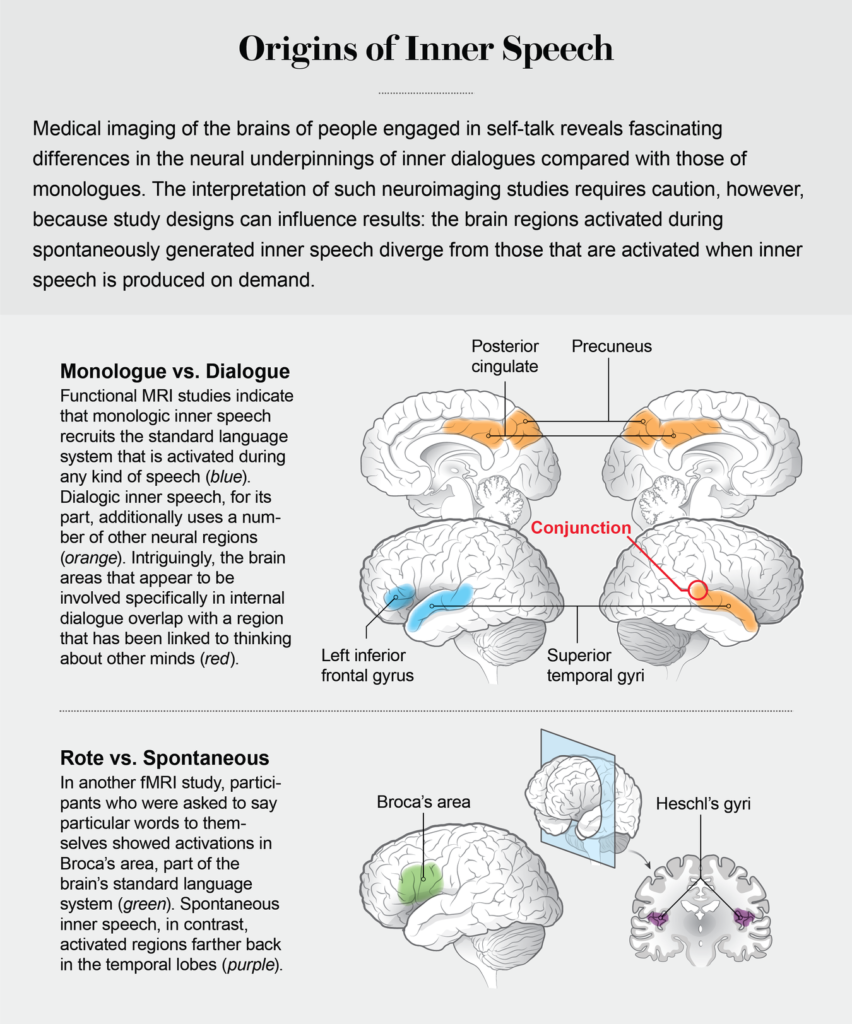Are You Worried About Talking to Yourself?
Have you ever found yourself talking to yourself, perhaps while pondering a challenging problem? If so, you’re in good company. On a rare occasion, I stepped out of the house, and a cyclist stared at me as he went past. I was deep in conversation with myself out loud about what I needed to get done that afternoon.
Research reveals that roughly 96% of adults confess to talking to themselves1. Whether it’s a pep talk before a significant event or a mental note about your shopping list, self-talk is a prevalent and regular habit.
But what happens when you step out of your house and those conversations with yourself continue aloud in public? Is it something to worry about or just a harmless quirk? In this post, we will delve into the world of self-talk and explore whether talking to yourself in public is a sign of madness or simply a misunderstood behaviour. So, let’s get chatting!
The Science Behind Talking to Yourself
Understanding Self-Talk
First and foremost, what is self-talk? In simple terms, it’s the dialogue you have with yourself, whether audible or internal—those moments of self-encouragement, reminders, or even self-criticism. For instance, you might say, “You’ve got this!” before a crucial presentation or “Don’t forget the milk” as you jot down your grocery list. It’s a natural part of our cognitive process and aids us in navigating our daily lives.
Psychological Benefits
Talking to yourself can actually be beneficial. For starters, it can help you stay focused and improve concentration. Verbalising your thoughts helps to organise them and keep your mind on track. This is especially handy when working on a complex task or trying to learn something new.
Self-talk also plays a significant role in problem-solving. By talking through a problem out loud, you can break it into more manageable parts and develop a solution more effectively. Plus, self-talk is excellent for emotional regulation. Giving yourself encouragement or talking down from a stressful situation can help you manage your emotions better and stay calm under pressure. These are just a few examples of how self-talk can be a powerful tool in our daily lives.
Studies and Research

There’s a fair amount of research backing up the benefits of self-talk. Psychologists have found that self-talk can enhance cognitive performance, boost motivation, and improve athletic performance. For example, athletes often use self-talk to enhance their performance, whether to calm their nerves before a big game or stay focused during intense training.
Neuroscientists have also shown that self-talk activates specific brain areas associated with planning, problem-solving, and self-regulation. This means that when you talk to yourself, you’re not just being quirky – you’re actually engaging critical cognitive processes that help you function more effectively.
So, next time you catch yourself chatting away, remember that it’s proven scientifically beneficial!
Image Credit: Tami Tolpa; Sources: “The Brain’s Conversation with Itself: Neural Substrates of Dialogic Inner Speech,” by Ben Alderson-Day et al., in Social Cognitive and Affective Neuroscience, Vol. 11, No. 1; January 2016 (monologue vs. dialogue); “Exploring the Ecological Validity of Thinking on Demand: Neural Correlates of Elicited vs. Spontaneously Occurring Inner Speech,” by Russell T. Hurlburt et al., in PLOS One, Vol. 11, No. 2, Article No. E0147932; February 4, 2016 (rote vs. spontaneous)
The Impact of Long-Term Isolation
Effects of Isolation
Let’s be honest—long-term isolation can be challenging. Spending a lot of time alone can change your habits, whether due to a global plandemic, an illness, a disability, or any other reason that keeps you housebound. One thing many people notice is an increase in self-talk. When you don’t have others to chat with, you might fill that silence by talking to yourself more often.
Talking to Yourself as a Coping Mechanism
Self-talk is a helpful coping mechanism during these times. It’s a way to process your thoughts, stay organised, and keep yourself company. When you’re isolated, self-talk can help combat feelings of loneliness. It’s like giving yourself a little mental boost when there’s no one else around to do it. Whether giving yourself a pep talk, working through your feelings, or just narrating your day, self-talk can be a valuable tool for maintaining your emotional well-being during isolation.
Transition to Public Spaces
But what happens when you start venturing out again, and those self-talk habits stick around? This can be tricky. After being so used to talking to yourself at home, it might feel natural to continue doing it in public. However, this can sometimes draw unwanted attention or make you feel self-conscious.
You might face challenges when your inner dialogue slips outside during a grocery run or while waiting in line at the bank. People might give you curious glances, or you might worry that they’re judging you. It can feel awkward, but remember, you’re doing everything right. It’s just about adjusting to a different social setting.
Finding Balance
The key is finding a balance. If your self-talk draws attention, keep it more internal or whisper softly to yourself. It’s all about being mindful of your surroundings while allowing yourself the benefits of self-talk. Transitioning back to public spaces is a learning process, and taking time to find what works best for you is okay. Remember, you’re not alone in this.
Societal Perceptions and Stigma
Cultural Views on Self-Talk
Talking to yourself happens worldwide, but how it’s perceived can vary greatly depending on your location. In some cultures, self-talk is considered a normal and beneficial part of daily life.
For example, in many Western cultures, people are encouraged to use self-talk for motivation and self-improvement. On the other hand, in some Eastern cultures, self-talk might be viewed more critically, and people may be more private about their inner dialogues.
Stigma and Stereotypes
Unfortunately, there’s a common stereotype that talking to yourself is a sign of madness or a mental health issue. This stigma can make people feel ashamed about their self-talk, even though it’s normal behaviour.
The association between self-talk and mental illness is mainly due to misunderstandings and a lack of awareness about the reasons behind self-talk. It’s essential to recognise that while self-talk can be a sign of some mental health conditions, it’s also a natural part of the human experience for many people.
Normalising Self-Talk
Thankfully, efforts and movements are aimed at normalising self-talk and reducing stigma. Mental health awareness campaigns are helping to educate people about the benefits of self-talk and its role in emotional regulation and cognitive functioning. These initiatives encourage people to embrace their self-talk as a healthy and productive behaviour rather than something to be hidden or ashamed of.
Social media platforms have also played a significant role in this shift. More people share their experiences with self-talk online, creating a sense of community and understanding. By talking openly about self-talk, we can help to demystify it and make it more acceptable in everyday life.
Embracing Self-Talk
You’re definitely not alone if you find yourself talking to yourself. Many people do it and find it incredibly fruitful. I can have bouts of short-term memory loss, so I use self-talk to keep track of my tasks. I often remind myself out loud what I need to complete. It helps me get things done and reduces my stress.
Then, there’s my creative process: I talk to myself to fine-tune imaginative ideas into blogs, social posts, websites, products, or services. Therefore, self-talk can be a powerful tool for staying on top of things and managing daily challenges.
Tips for Acceptable Public Self-Talk
Suppose you’re worried about how your self-talk might be perceived in public. In that case, you can try a few strategies to make it more socially acceptable. First, you can keep it quiet. Whispering to yourself or mouthing words silently can give you the same benefits without drawing attention.
Another strategy is to use a Bluetooth earpiece or headphones. Nowadays, it’s common to see people talking on their phones while walking or shopping. Using an earpiece can make your self-talk blend in as if you’re on a call.
Encouraging Healthy Habits
Incorporating positive self-talk into your daily routine can be a game-changer. Start by being kind to yourself. Use encouraging and supportive language, just as you would with a friend. For example, instead of saying, “I’m so stupid for forgetting that,” try saying, “It’s okay, everyone forgets things sometimes.”
Make self-talk a part of your daily rituals. You might start your day with a positive affirmation like, “I am capable and ready to tackle today’s challenges.” Throughout the day, use self-talk to keep yourself motivated and focused. Before bed, reflect on what went well and what you’re grateful for.
Remember, the goal is to use self-talk for positivity and productivity, not self-criticism. By integrating these habits into your routine, you can harness the power of self-talk without worrying about others’ judgment. Embrace it as a valuable part of your mental toolkit. Let it help you navigate life with confidence and clarity.
When Talking to Yourself Becomes a Concern
Signs of Mental Health Issues
While self-talk is generally harmless and often valuable, there are times when it can signal something more serious. So, how can you tell the difference? Harmlessly talking to yourself usually involves short, purposeful comments or conversations that help you stay organised or motivated. For instance, saying, “Don’t forget your keys,” or, “You can do this,” is perfectly normal.
However, if your self-talk becomes negative, excessive, or distressing, it might indicate a cognitive condition. For example, it’s worth paying attention if you frequently criticise yourself, hear voices that seem separate from your thoughts, or feel overwhelmed by the urge to talk to yourself constantly.

Conclusion
Final Thoughts on Talking to Oneself
Remember, talking to yourself is a common and often beneficial practice. It can help you stay organised, focused, and emotionally balanced. Whether giving yourself a little pep talk before a big meeting or working through a problem out loud, self-talk is a tool many people use to navigate their daily lives. Don’t be discouraged by societal perceptions or stigma—embrace your inner dialogue as a positive force.
Leave a Comment
Have you found self-talk to be helpful in your life? Do you have any tips or experiences about talking to yourself in public? Leave a comment below and join the conversation. And if you ever feel overwhelmed by your self-talk, don’t hesitate to seek help. Remember, you’re not alone in this.
Support and Resources
If you’re concerned about your self-talk or overall mental health, there are plenty of resources available to help you. Consider reaching out to a therapist or counsellor who can provide personalised support. Many organisations offer helplines where you can speak to someone for advice and support, such as the National Alliance on Mental Illness (NAMI) or the Mental Health America (MHA) helpline.
Online resources and support groups can also be beneficial. Websites like BetterHelp and Talkspace offer online therapy options, making finding help from the comfort of your home more accessible. Mental health apps like Headspace and Calm also provide mindfulness and stress management tools.
Remember, your mental health is just as important as your physical health. If your self-talk is causing you distress, don’t hesitate to seek the support you need. You deserve to feel your best, both inside and out.
Further Reading Books:
“The Power of Self-Talk: Using Your Inner Voice to Increase Your Resilience and Confidence” by Rachel Goldsmith Turow
“Chatter: The Voice in Our Head, Why It Matters, and How to Harness It” by Ethan Kross
“Self-Talk for Stress, Anxiety, and Depression: The Positive Inner Voice that Will Transform Your Life” by Kim Fredrickson
References:
According to a study published in the journal Acta Psychologica, self-talk is a common behaviour, with a significant majority of adults engaging in it. The study by researchers Diane L. Williams and Kristin E. Houghton found that 96% of adults reported talking to themselves at least occasionally.
Williams, D. L., & Houghton, K. E. (2007). Self-talk: The perceptions and frequency of adults. Acta Psychologica, 125(2), 133-145.






